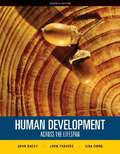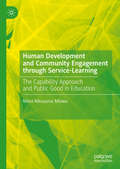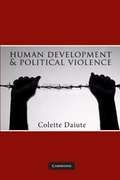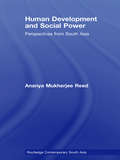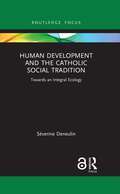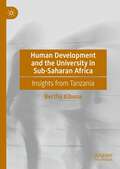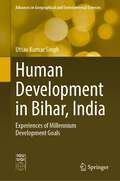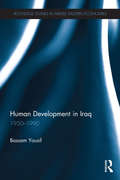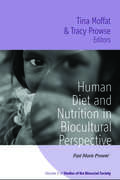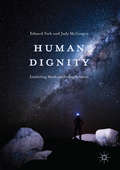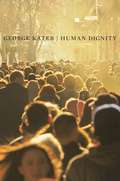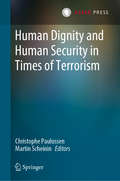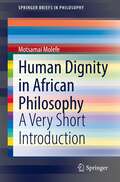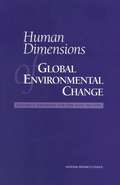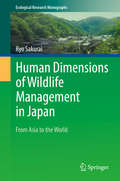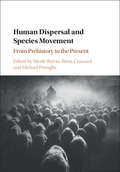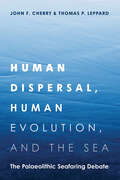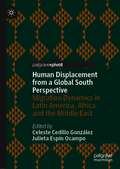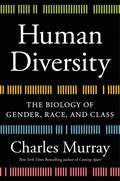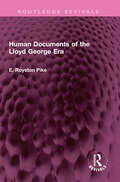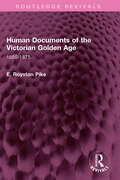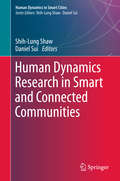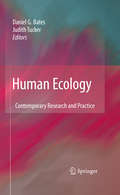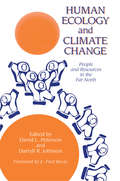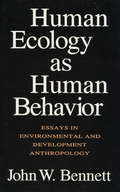- Table View
- List View
Human Development Across the Lifespan
by Lisa B. Fiore John S. Dacey John F. TraversAll of the lifespan without all of the bells and whistles. This chronologically-organized text is less expensive and briefer than most Lifespan texts. Its numerous examples drawn from education, nursing, and psychology make the content relevant to students from a variety of majors and backgrounds, while a highly praised study guide integrated into the text promotes and reinforces conceptual understanding.
Human Development and Community Engagement through Service-Learning: The Capability Approach and Public Good in Education
by Ntimi Nikusuma MtawaThis book establishes community engagement and service-learning as pathways to advancing human development and common good. Using the human development and capability approach as normative frameworks, with South Africa as a frame of reference, the author investigates the theoretical contributions and ultimate benefits of university-community partnerships. In doing so, this book demonstrates that three interrelated capabilities – affiliation, common good professionals and local citizenship – are developed through community engagement and service-learning. Subsequently, the notion of transformative change through community engagement and service-learning is illuminated, particularly when operating within the context of power differentials, inequality and extreme poverty. This book will be of interest and value to students and scholars of service-learning, and its implications for partnerships between universities and external communities.
Human Development and Political Violence
by Colette DaiuteHuman Development and Political Violence presents an innovative approach to research and practice with young people growing up in the context of political violence. Based on developmental theory, this book explains and illustrates how children and youth interact with environments defined by war, armed conflict, and the aftermath involving displacement, poverty, political instability, and personal loss. The case study for this inquiry was a research workshop in four countries of the former Yugoslavia, where youth aged 12 to 27 participated in activities designed to promote their development. The theory-based Dynamic Story-Telling by Youth workshop engaged participants as social historians and critics sharing their experiences via narratives, evaluations of society, letters to public officials, debates, and collaborative inquiries. Analyses of these youth perspectives augment archival materials and researcher field notes to offer insights about developmental strategies for dealing with the threats and opportunities of war and major political change.
Human Development and Social Power: Perspectives from South Asia (Routledge Contemporary South Asia Ser.)
by Ananya Mukherjee ReedIn South Asia and beyond, human development continues to be in a state of crisis. Each successive Human Development Report (HDR) and the pervasive global failure to achieve the Millennium Development Goals are constant reminders of this crisis. An equally, and even more distressing dimension of human development is its great unevenness. Even in cou
Human Development and the Catholic Social Tradition: Towards an Integral Ecology (Routledge Research in Religion and Development)
by Séverine DeneulinThis book brings development theory and practice into dialogue with a religious tradition in order to construct a new, transdisciplinary vision of development with integral ecology at its heart. It focuses on the Catholic social tradition and its conception of integral human development, on the one hand, and on the works of economist and philosopher Amartya Sen which underpin the human development approach, on the other. The book discusses how these two perspectives can mutually enrich each other around three areas: their views on the concept and meaning of development and progress; their understanding of what it is to be human – that is, their anthropological vision; and their analysis of transformational pathways for addressing social and environmental degradation. It also examines how both human development and the Catholic social tradition can function as complementary analytical lenses and mobilizing frames for embarking on the journey of structural and personal transformation to bring all life systems, human and non-human, back into balance. This book is written for researchers and students in development studies, theology, and religious studies, as well as professional audiences in development organizations.
Human Development and the University in Sub-Saharan Africa: Insights from Tanzania
by Bertha KibonaThis book utilises a human development and capability approach to examine the role of higher education in the context of Tanzania. The author considers decolonisation debates as they relate to African concerns in order to make a case for systems design and implementation implications for decolonising higher education institutions. The book will be of interest to students, scholars and policymakers in the field of higher education.
Human Development in Bihar, India: Experiences of Millennium Development Goals (Advances in Geographical and Environmental Sciences)
by Utsav Kumar SinghThis book introduces the issues of the contemporary state of Bihar, India, in terms of its performance on the Millennium Development Goals (MDGs) indicators and the initiatives taken by the central and state governments towards realizing human development. Doing so, it draws upon the mistakes committed in the past and moves ahead towards a better future with the idea of sustainable human development. The book also presents a comprehensive evaluation of the background and indicators of the human development index, and it analyses the impact of COVID-19 on India in general and on Bihar in particular. India is a nation of unbalanced states in terms of development. In spite of all the development initiatives, India still contains states that have not conformed to the breakthrough claimed by the nation, and the state of Bihar falls under this category. Bihar has emerged as the worst performer in human development, based on the ranking of the Human Development Index 2020. Nevertheless, Bihar has the potential for overall development to achieve its glorious past once again, by various pro-poor policies implemented by the government of Bihar in the last two decades, which is critically analysed in detail.
Human Development in Iraq: 1950-1990 (Routledge Studies in Middle Eastern Economies)
by Bassam YousifThis systematic evaluation of Iraq’s political economy and human development offers a complex and sophisticated analysis of Iraq’s recent history. Focusing on the period from 1950 up to the Gulf war in 1990, the book brings an understanding of how development has been shaped or constrained in this much misunderstood country. The author employs the human development paradigm to link human development and human rights to the analysis of political economy. The resulting scholarship, on income and investment, education and health, the status of women, and human rights, presents a nuanced, balanced - but critical - appraisal of the complex interrelationships between economic growth and development and illustrates the fragility of that development, especially when political institutions fail to keep up with the rapid expansion in human capabilities. Providing the historical analysis needed to understand Iraq’s current political situation, this book will be of great interest to scholars of development studies, Iraq, and political economy.
Human Diet And Nutrition In Biocultural Perspective
by Tina Moffat Tracy ProwseThere are not many areas that are more rooted in both the biological and social-cultural aspects of humankind than diet and nutrition. Throughout human history nutrition has been shaped by political, economic, and cultural forces, and in turn, access to food and nutrition has altered the course and direction of human societies. Using a biocultural approach, the contributors to this volume investigate the ways in which food is both an essential resource fundamental to human health and an expression of human culture and society. The chapters deal with aspects of diet and human nutrition through space and time and span prehistoric, historic, and contemporary societies spread over various geographical regions, including Europe, North America, Africa, and Asia to highlight how biology and culture are inextricably linked.
Human Dignity
by Edward Sieh Judy McgregorThis book examines the concept of dignity from a variety of global perspectives. It scrutinizes how dignity informs policy and practice, and is influenced by international and domestic law, human rights values, and domestic politics. An exciting collection of essays, this edited volume provides an analysis of human rights as they are experienced by real people who have in many cases been forced to take action to further their own interests. Readers will discover an extensive range of issues discussed, from the internet, climate change and disabilities, to globalization, old-age, and migrants' rights. The last section deals with the impact of various issues on indigenous and migrant populations, specifically violence in Columbia, border issues in Tijuana, women's and children's rights violations, and the complex problems experienced by refugees, particularly in regards to citizenship. The interdisciplinary nature of this work makes it an invaluable read for scholars of Health Studies, Law, Human Rights, Sociology and Politics.
Human Dignity
by George KatebWe often speak of the dignity owed to a person. And dignity is a word that regularly appears in political speeches. Charters are promulgated in its name, and appeals to it are made when people all over the world struggle to achieve their rights. But what exactly is dignity? When one person physically assaults another, we feel the wrong demands immediate condemnation and legal sanction. Whereas when one person humiliates or thoughtlessly makes use of another, we recognize the wrong and hope for a remedy, but the social response is less clear. The injury itself may be hard to quantify. Given our concern with human dignity, it is odd that it has received comparatively little scrutiny. Here, George Kateb asks what human dignity is and why it matters for the claim to rights. He proposes that dignity is an “existential” value that pertains to the identity of a person as a human being. To injure or even to try to efface someone’s dignity is to treat that person as not human or less than human—as a thing or instrument or subhuman creature. Kateb does not limit the notion of dignity to individuals but extends it to the human species. The dignity of the human species rests on our uniqueness among all other species. In the book’s concluding section, he argues that despite the ravages we have inflicted on it, nature would be worse off without humanity. The supremely fitting task of humanity can be seen as a “stewardship” of nature. This secular defense of human dignity—the first book-length attempt of its kind—crowns the career of a distinguished political thinker.
Human Dignity and Human Security in Times of Terrorism
by Martin Scheinin Christophe PaulussenIn this book, it is explained that despite a current drop in the number of deaths, terrorism should still be considered a serious and widespread problem. However, the responses to this phenomenon are often more problematic from a long-term perspective. With the human rights framework under serious pressure, this edited volume offers a timely, important and critical in-depth analysis of human dignity and human security challenges in the lead-up, and in the responses, to current forms of terrorism. It aims to map how human dignity and human security can be secured and how law can constitute a source of trust at a time when Europe and the rest of the world continue to be plagued by terrorism.The authors are both established names and upcoming talent in this fastchanging and exciting field of law. They thoroughly analyse a variety of topical subjects, in more conceptual chapters—for example calling for the humanisation of the security discourse—and in highly practical contributions, in which for instance the Kafkaesque situation in which rendition and torture victim Abu Zubaydah still finds himself today is considered.This book, which focuses on, but is not limited to the situation in Western countries, aims to inspire not only academics—through further theorisation on the sometimes elusive but important concepts of human dignity and human security—but also practitioners working in the field of countering terrorism. It will hopefully convince them (even more) that following a human rights approach will be indispensable in securing human dignity and human security for all. Even—or in fact: especially—in times of terrorism.Christophe Paulussen is a Senior Researcher in the Research Department of the T.M.C. Asser Instituut in The Hague, The Netherlands and Martin Scheinin is Professor of International Law and Human Rights in the Department of Law of the European University Institute (EUI) in Florence, Italy.
Human Dignity in African Philosophy: A Very Short Introduction (SpringerBriefs in Philosophy)
by Motsamai MolefeThis book throws a spotlight on the under-explored African perspective on the mercurial concept of human dignity. To do so, it employs two strategies. In the first instance, it considers African theories of human dignity: (1) vitality; (2) community; (3) Personhood. Secondly, it explores the plausibility of these theories by applying them to select applied ethics themes, specifically: animal ethics, disability ethics and euthanasia. The aim of this book is not to argue for the plausibility of these African theories, but to familiarize the global audience of philosophy, ethics and related disciplines (legal studies, sociology, bioethics and so on) with a neglected African perspective on this vital concept. The books is aimed at scholars of philosophy interested in non-European and specifically African perspective.
Human Dimensions of Global Environmental Change: Research Pathways for the Next Decade
by Committee on the Human Dimensions of Global ChangeThe National Academies Press (NAP)--publisher for the National Academies--publishes more than 200 books a year offering the most authoritative views, definitive information, and groundbreaking recommendations on a wide range of topics in science, engineering, and health. Our books are unique in that they are authored by the nation's leading experts in every scientific field.
Human Dimensions of Wildlife Management in Japan: From Asia to the World (Ecological Research Monographs)
by Ryo SakuraiThis book discusses the findings of research on the human dimensions of wildlife management conducted in Japan, demonstrating how such research and approaches have contributed to mitigating human-wildlife conflicts.Human-wildlife conflicts, including agricultural and property damage as well as occasional casualties, are a global problem for which local residents, managers, and stakeholders around the world are struggling to find solutions. Human dimensions of wildlife management (HDW) is an academic field developed in North America in the 1970s to gather information on the social aspects of human-wildlife issues to help wildlife managers and stakeholders implement effective decision-making measures. However, HDW is not widely recognized or applied outside North America, and few studies have investigated whether HDW approaches would be effective in different cultural settings.This is the first book written in English to introduce the HDW theories and practices implemented in Asia. Presenting innovative approaches and research techniques, as well as tips on how to introduce HDW methods into culturally different societies, it is a valuable resource not only for researchers and students in this field, but also for government officials/managers, NGOs, residents and other stakeholders who are affected by human-wildlife conflicts around the globe.
Human Dispersal and Species Movement
by Nicole Boivin Rémy Crassard Michael PetragliaHow have humans colonised the entire planet and reshaped its ecosystems in the process? This unique and groundbreaking collection of essays explores human movement through time, the impacts of these movements on landscapes and other species, and the ways in which species have co-evolved and transformed each other as a result. Exploring the spread of people, plants, animals, and diseases through processes of migration, colonisation, trade and travel, it assembles a broad array of case studies from the Pliocene to the present. The contributors from disciplines across the humanities and natural sciences are senior or established scholars in the fields of human evolution, archaeology, history, and geography.
Human Dispersal, Human Evolution, and the Sea: The Palaeolithic Seafaring Debate
by John F. Cherry Thomas P. LeppardHuman Dispersal, Human Evolution, and the Sea is the first book-length treatment of what has become known as the global Palaeolithic seafaring debate. Until recently, common consensus dictated that only in the last ten thousand years have humans routinely, permanently, and cross-culturally traversed seas and oceans to colonize new lands. New (and sometimes contentious) data from the Mediterranean and Island Southeast Asia challenge that consensus, suggesting to some researchers that long-distance voyaging is a behavior of great antiquity. These scholars suggest that oceans and seas facilitated and encouraged planetary dispersal in our own genus rather than acting as barriers to dispersal. If this model is correct, it necessitates a radical rethinking of not only the big patterns of human history but also more deeply our models of emergent human behavior and when the capacity for highly complex and coordinated group behaviors emerged. Exploring the data in detail, the authors here show how a complex series of interrelated problems has tended to be treated in reductionist or overly simplistic terms. Cherry and Leppard elucidate this complexity by bringing to bear perspectives from archaeology, ecology, and evolutionary biology. They demonstrate not only that a series of unique circumstances—evolutionary, behavioral, environmental, and economic—conspired to drive mass, ubiquitous global colonization over the last ten millennia; but also that earlier, sparser data provide real insight into key social and behavioral thresholds, even if there is little evidence to support the “oceans as highways” model for species other than our own. A major intervention in this important debate, Human Dispersal, Human Evolution, and the Sea explains the deep significance of the problem and the profound implications for history, archaeology, and biological anthropology.
Human Displacement from a Global South Perspective: Migration Dynamics in Latin America, Africa and the Middle East
by Celeste Cedillo González Julieta Espín OcampoThis book focuses on inclusion and governance agenda on the issue of migration within a framework of South-South cooperation. Increasing migration waves present an extraordinary and complex challenge to the international community. In the existing literature, migration processes have been described mostly from Western perspectives, and although these perspectives are analytically relevant, they lack the advantage of a broader interpretation. Taking a Global South approach, this volume gives voices to authors from several Latin American and Latin European universities to offer a more dynamic discussion of the challenges of migration in the twenty-first century. The authors take a broad perspective of global migration, with a focus on case studies from the Global South that highlight Latin American and North African experiences in particular.
Human Diversity: The Biology of Gender, Race, and Class
by Charles MurrayAll people are equal but, as Human Diversity explores, all groups of people are not the same -- a fascinating investigation of the genetics and neuroscience of human differences.The thesis of Human Diversity is that advances in genetics and neuroscience are overthrowing an intellectual orthodoxy that has ruled the social sciences for decades. The core of the orthodoxy consists of three dogmas:- Gender is a social construct.- Race is a social construct.- Class is a function of privilege. The problem is that all three dogmas are half-truths. They have stifled progress in understanding the rich texture that biology adds to our understanding of the social, political, and economic worlds we live in.It is not a story to be feared. "There are no monsters in the closet," Murray writes, "no dread doors we must fear opening." But it is a story that needs telling. Human Diversity does so without sensationalism, drawing on the most authoritative scientific findings, celebrating both our many differences and our common humanity.
Human Documents of the Lloyd George Era (Routledge Revivals)
by E. Royston PikeFirst published in 1972, Human Documents of the Lloyd George Era presents the years when Lloyd George was in his prime, and his career in peace and war may be seen as the frame in which the ‘documents’ find their proper place; but the book’s real subject is not Lloyd George, it is the People, with whom he identified himself and spent his long life trying to serve. For the purpose of this book Lloyd George Era is taken as the period from 1905. The early documents enable us to reconstruct a vivid picture of life as it was lived ‘before the war’ by such people as London artisans, Middlesbrough ironworkers, Lancashire factory hands, Northumbrian pit-folk and farm labourers, while extracts from reports of the first ‘Lady Factory Inspectors’ and of the great Royal Commission on the Poor Law highlight the grim situation of the ‘Pauper Host’. With the outbreak of war, the mood changes, as Lloyd George leads the People in a massive war effort on the home front, producing munitions and trying to maintain normal industrial output. A glimpse is given of the various contributions made by women. Out of a vast mass of tiny details a picture emerges of an essentially peace- loving people joining forces to achieve what Lloyd George called ‘the bloodstained stagger’ to victory. This is an essential read for students of British history.
Human Documents of the Victorian Golden Age: 1850-1875 (Routledge Revivals)
by E. Royston PikeFirst published in 1967 Human Documents of the Victorian Golden Age presents a collection of ‘documents’, textual and pictorial, and human, illustrating and describing what the author calls, one of the most vigorous, vital, fertile periods in the history of the modern world. The material has been arranged in eight main chapters most of which have subdivisions. The first chapter has for its subject The Great Exhibition of 1851, and this is followed by life and labour, a series of picturesquely detailed description of London and the great industrial regions. Young England is concerned with the juvenile workers in factory and workshop. Next, we have the longest chapter in the book Queen Victoria's sisters containing number of documents describing the life of women in domestic service, the London dress factories and workshops, pit- banks and brickfields and in agriculture. Closely connected with this is home sweet home and then the chapter on the sanitary idea. Workers Unite! echoes Karl Marx but it has to do with the British working men who founded the modern trade union and cooperative movements. The last chapter talks about prostitutes and her clients and various environments in which the trade was carried on. This is an essential read for students of British history.
Human Dynamics Research in Smart and Connected Communities
by Daniel Sui Shih-Lung ShawThis book addresses how accelerating advances in information and communication technology, mobile technology, and location-aware technology have fundamentally changed the ways how social, political, economic and transportation systems work in today’s globally connected world. It delivers on many exciting research questions related to human dynamics at both disaggregate and aggregate levels that attract the attention of researchers from a wide range of disciplines. Human Dynamics Research involves theoretical perspectives, space-time analytics, modeling human dynamics, urban analytics, social media and big data, travel dynamics, privacy issues, development of smart cities, and problems and prospects of human dynamics research. This book includes contributions on theoretical, technical, or application aspects of human dynamics research from different disciplines. Appealing to researchers, scholars and students across a wide range of topics and disciplines including: urban studies, space-time, mobility and the internet, social media, big data, behavioral geography and spatio-temporal-network visualization, this book offers a glimpse at the cutting edge of research on human dynamics.
Human Ecology
by Judith Tucker Daniel G. BatesThis comprehensive sourcebook on human ecology combines 25 source articles published in the journal Human Ecology, enhanced with new research updates and thematic commentary. Intended as a follow up to Case Studies in Human Ecology, this volume includes an entirely new group of articles, with the same accessible, comprehensive coverage that made Case Studies so popular. Human Ecology: Research and Practice covers four important areas: Philosophy, Theory and Methods; Changing Subsistence Practices; Agricultural Intensification and Population Dynamics; and, Common Property Resources and Conservation. As a group, these articles represent the major contributions to the study of Human Ecology since the publication of the previous volume. Each article includes a concise introduction by the Editor, giving necessary and thoughtful context. The volume covers an overview of human ecology as a field within environmental studies, new directions in contemporary research, new methods and techniques, and cultural landscapes. Anyone studying human ecology, environmental studies, landscape studies, or population dynamics, particularly key issues such as conservation and globalization will find this comprehensive reader a valuable resource.
Human Ecology And Climatic Change: People And Resources In The Far North
by David L. Peterson Darryll R. JohnsonThe Far North, a land of extreme weather and intense beauty, is the only region of North America whose ecosystems have remained reasonably intact. Humans are newcomers there and nature predominates. As is widely known, recent changes in the Earth's atmosphere have the potential to create rapid climatic shifts in our life-time and well into the future. These changes, a product of southern industrial society, will have the greatest impact on ecosystems at northern latitudes, which until now have remained largely undisturbed. In this fragile balance, as terrestrial and aquatic habitats change, animal and human populations will be irrevocably altered.
Human Ecology as Human Behavior: Essays in Environmental and Developmental Anthropology
by John W. BennettHuman interaction with the natural environment has a dual character. By turning increasing quantities of natural substances into physical resources, human beings might be said to have freed themselves from the constraints of low-technology survival pressures. However, the process has generated a new dependence on nature in the form of complex "socionatural systems," as Bennett calls them, in which human society and behavior are so interlocked with the management of the environment that small changes in the systems can lead to disaster. Bennett's essays cover a wide range: from the philosophy of environmentalism to the ecology of economic development; from the human impact on semi-arid lands to the ecology of Japanese forest management. This expanded paperback edition includes a new chapter on the role of anthropology in economic development.Bennett's essays exhibit an underlying pessimism: if human behavior toward the physical environment is the distinctive cause of environmental abuse, then reform of current management practices offers only temporary relief; that is, conservationism, like democracy, must be continually reaffirmed. Clearly presented and free of jargon, Human Ecology as Human Behavior will be of interest to anthropologists, economists, and environmentalists.
